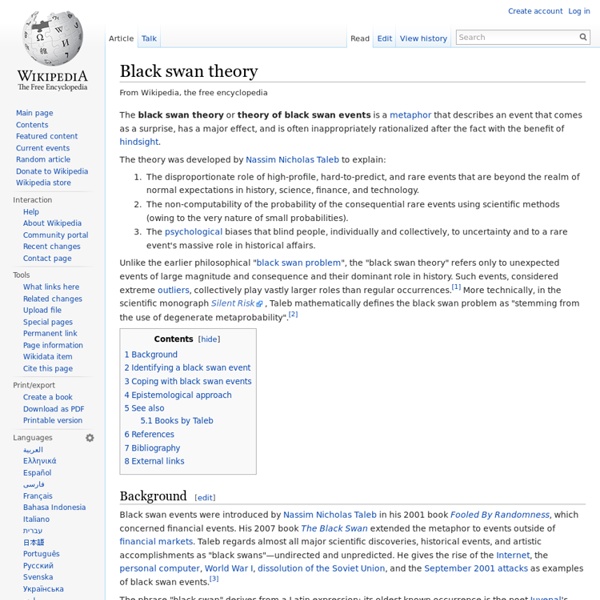Black swan theory

The Black Swan (Taleb book)
book about mathematical finance The Black Swan: The Impact of the Highly Improbable is a 2007 book by author and former options trader Nassim Nicholas Taleb. The book focuses on the extreme impact of rare and unpredictable outlier events—and the human tendency to find simplistic explanations for these events, retrospectively. The book covers subjects relating to knowledge, aesthetics, as well as ways of life, and uses elements of fiction and anecdotes from the author's life to elaborate his theories. Coping with Black Swan events[edit] A central idea in Taleb's book is not to attempt to predict Black Swan events, but to build robustness to negative events and an ability to exploit positive events. The book asserts that a "Black Swan" event depends on the observer: for example, what may be a Black Swan surprise for a turkey is not a Black Swan surprise for its butcher. Summary[edit] Taleb acknowledges a contradiction in the book. Argument[edit] Reception[edit] See also[edit] Notes[edit]
2X Entrepreneur Turned Venture Capitalist | Both Sides of The Table
10 European Startups To Watch in 2011
When you hear Silicon Valley discuss the European startup scene it’s often negatively. Some say that the investors aren’t brave enough, some say the entrepreneurs aren’t bold enough. Whether there’s any truth in these accusations or not, the fact is that there are startups across Europe that are brimming with original ideas and creativity. Following on from our 10 Exciting European Startups from 2010, here are 10 startups to look out for in 2011. Pearltrees Visitors to the LeWeb conference last month couldn’t have failed to spot Pearltrees. Pearltrees makes organising groups of links to content incredibly easy. Recent additions to the service include real-time group collaboration and a touch-screen based interface which will be ported to the iPad soon. Planely The idea behind Planely is a certainly niche one, but the Danish startup could well be onto something that frequent air travellers will love. Geomium LikeOurselves Storific Datasift SuperMarmite Viewdle Screach Shutl
Guide to Evaluating Startup Ideas - Tony Wright's Startup Front-End -
A great developer I once worked with was kvetching at lunch one day. He’d been working at a well-funded startup for about a year and had come to terms with the fact that the startup was really a pretty dumb idea. He’d wasted a year of his life and had a pile of stock options that weren’t very interesting. His last two jobs had been similar. He asked me a question that, at the time, I didn’t have a good answer for. Since I’ve announced that I’m moving on in the coming weeks/months, I’ve been bombarded with cool offers at existing startups, larger companies, and, of course, I’ve been pondering some of my own startup ideas. So without further ado, here is my “checklist for good startup ideas”. How deeply do you think the startup will effect people’s lives? That’s my list.
Related:
Related:



